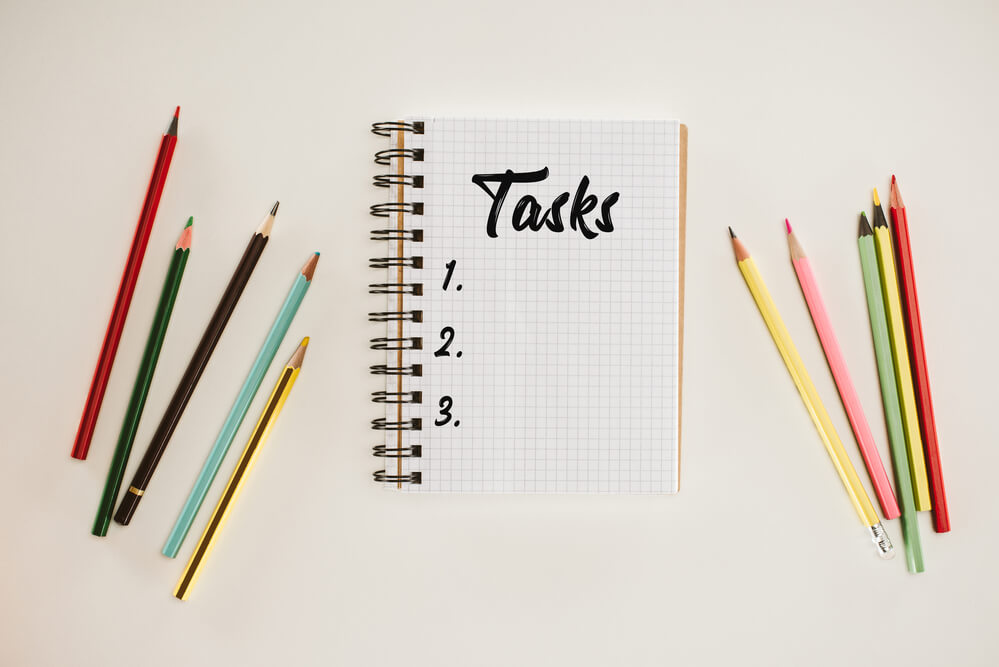How to Work More Efficiently and Get More Done
The inspiration for this post comes from Chelsea Hamlet, a member of the Smutlancers Community. I realized my answer to a question she asked could be a blog post on its own, and here we are.
If you feel like you work fairly slowly, and you wonder how you can possibly take on another client or another job to make more money, this is for you. They’re productivity tips, but not the “you’re not doing enough, here’s how to hustle and grind it out” tips.
This is for the people who think, “I need to make enough money to pay the bills, but I work at a snail’s pace. How can I possibly fit in more work?”
For anyone who wants to know how to get more done in the time you have, here’s how I do it. (And yes, if you’ve ever wondered specifically how I get things done, this is it. As always, your results may vary.)
Make a To-Do List

I say this all the time, and you’re probably tired of hearing it. Write, type, or record a list of the things you need to get done today — deadlines, routine assignments from clients, commitments you’ve made. Some of those commitments are to yourself like publishing a blog post. Some will be to patrons, clients, or subscribers.
If you don’t know what you need to get done, you’ll just flail about, picking whatever comes to mind first. You might get lucky and remember everything or do the money-making work first. Or you might not. A list gives you a path to follow for your day/week/month. Stick to the path. Don’t worry about tomorrow’s to-do list today.
Ideally a day’s to-do list should have 3-5 items on it, maybe 6. I don’t live that life. Sometimes I have to-do lists with 8-10 tasks and sometimes 12-15 tasks (and they’re all time-sensitive). Don’t be afraid to move things to the next day or later in the week if you don’t finish. You’re not the first person to get bogged down in a project or to make a too-long list. You didn’t fail if you don’t finish on time.
Figure Out Your Process
Everything can have a process. A process is the steps you take to complete a task. What’s your process to write a blog post, record a video, take a picture? Really think about this, and then write it down. Do this for every type of work you do (for clients and for yourself).
Are you drawing a blank? This may be where your time gets sucked up the most. If you do a task differently every time, you never get faster or more efficient.
If you’re not sure what a process can look like, this is mine for writing content for clients:
- Pick an idea from a list (all ideas are created at the end of one month for the next)
- Outline my initial thoughts with points to cover in the post (on paper)
- Research more points/unknown information online – take notes as needed
- Write a rough draft
- Skip the intro paragraph and start with the main points.
- Write an introductory paragraph
- Write a conclusion paragraph
- Edit rough draft
- Add links as needed/required
Minus the idea part, I use this to write my own blog posts, too.
Batch Work Whenever Possible

All my client’s content ideas are created at the end of one month to be written about in the next month. That’s an example of “batching.” Another way I batch tasks is to schedule multiple blog posts at one time for several days or weeks in a row. I do this mostly for podcast episodes that are pre-recorded and Masturbation Monday posts. Why? Because the post themselves follow a basic formula (a process). I spend an hour or two and have the work done for an entire month. It’s one less thing on my to-do list, and it’s quicker than switching my focus to this task once a week, every week.
What can you batch?
- Think of ideas for content you’ll write next week or next month; optionally map out which days of the week you’ll write each idea
- Take photographs or find images you want to use in your content all at once
- Batch record audio or video. Molly and I record two podcast episodes at a time for the Smutlancer podcast.
- Write multiple pieces of content back to back; edit them all later — I’ve done this for short content (500 words or so). I write three or four posts to get it done, and then I go back and edit it all, instead of write, edit; write, edit; write, edit.
By grouping like work together, you can stay in the headspace for that work and be more efficient and (probably) faster. Batching reduces your need to refocus attention as you switch tasks.
Remove or Reduce Distractions
Let’s be real. We get slowed down in our work, most often, by distractions. If you have kids, partners, roommates, or other people in your home while you work (hello, pandemic), some distractions are unavoidable. Kids always seem to need eleventy million snacks during the day. Other adults want to chat, ask questions, or get you to “come look at this real quick.” (Note: It is never “real quick.”)
If closing yourself away in a room and ignoring the world isn’t an option, I feel your pain. But you can reduce other distractions. Close all the apps and tabs for social media, Slack, even Skype (if you can) while you work. Even if it’s only for an hour. You’d be surprised at how much you can get done with one hour of uninterrupted time.
- Put your phone in another room or across the room outside of your reach.
- If possible, leave your phone on silent.
- Mute your laptop/computer so you don’t hear notifications coming in.
- Close your email while you work.
Here comes the hardest part — force yourself not to check those things even though you’ve closed the apps/tabs. I like to bribe myself. If I get this thing done, I can scroll Twitter for five minutes. Or I can’t check email until I’ve finished this task. Promise yourself whatever works for you.
Practice and Time Make You Faster and Better

If the work you do slowly now is something you want to do long-term — write for other sites, manage social media, whatever, there’s one thing I’m sure of: The longer you do it, the easier it becomes, and the faster you get. There’s no magic cure for time, y’all.
I can write 1000 words in 30 minutes of focused work. How? Because I’ve written 1000 words at a time, multiple times a week, for six years. When I first started, 1000 words might take me a couple of hours. These days, it only happens if it’s a new-to-me topic or it’s a new client with different expectations.
You can get faster and better on your own with less pressure (no paying clients required).
If you want to write for a living, write for yourself as practice. Blog your thoughts and allow yourself to grow comfortable with moving thoughts from your head and to a screen.
If you want to manage social media for a brand, practice on yourself or a willing friend first. Find the tools that work for you and learn how to use them. (The right tools make you more productive and faster, too.)
If you want to start a podcast or make videos, let yourself make the crappiest recordings and then learn to edit them. The more comfortable you grow in front of a mic or camera, the easier it becomes. The easier it becomes, (sometimes) the less you have to edit later. (Also, I’ve never met anyone who liked how they look or sound in a recording in the beginning. I hated it but now I’m used to it.)
The Bottomline
Learning how to work on your own thing or for yourself efficiently is a skill. Spend time figuring out what works best for you (even if no one else does it). And give yourself the time to be slow and to feel lost until you do your smutlancer thing long enough.
I remember my first months in freelancing with exactly two clients. I wrote two blog posts and sent out one newsletter a week, and it could take me two days to get it all done. These days, that would take me two hours, tops. Keep working, keep trying, and keep looking for ways to be more efficient.
Remember, the goal shouldn’t be to do as much work as humanly possible on a given day or week. It should be to do the work that means something to you and pays you enough so that you can live. In fact, as I pointed out to Chelsea, if you get better at the work you do, you can charge more for it. Which means, eventually, you can do less work and make more money. For me, that’s the ultimate goal. To make that happen, I’ve got to get out of my own way and work smarter, not harder.
